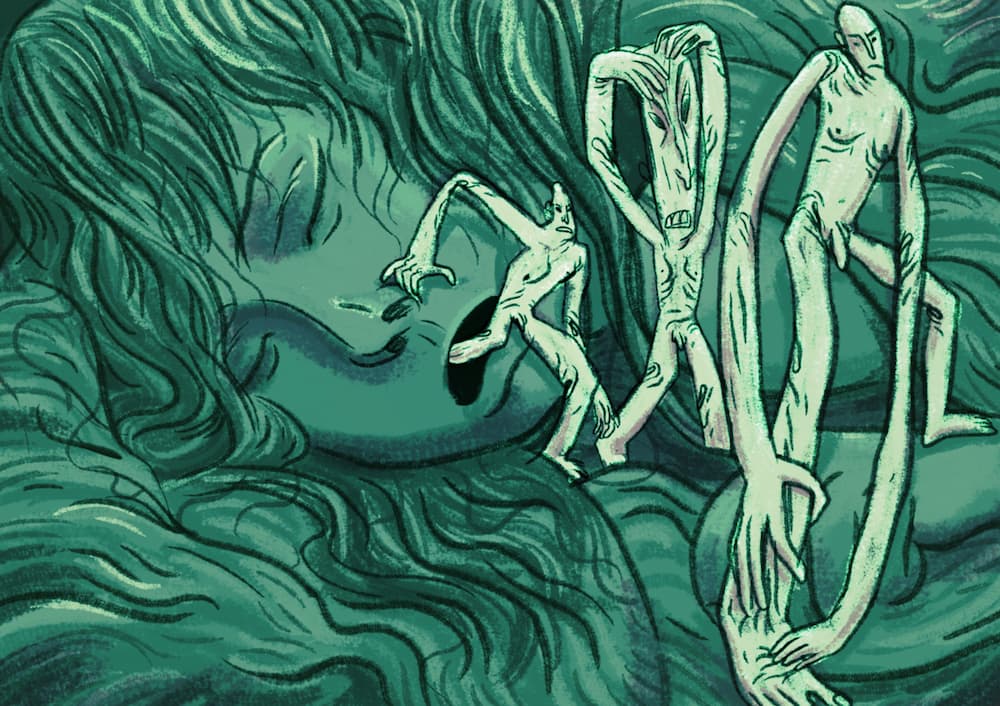A Tiny White Mouse #
Vampires are not the only popular myths from Transylvania: there are other peculiar beliefs, often broaden to other countries – or maybe borrowed from them, who knows. One is about the soul and it is told by mothers to their children: if you sleep with your mouth open, your soul will escape your body in the form of a tiny white mouse.
That’s a powerful image and it’s hard to forget – I’d bet that you will recall it next time you’ll see your partner sleeping. ’Silly Europeans, they have such a fantasy!’ one would think, blaming Medieval exaggerations… Well, sorry to tell you, but centuries before, in Guinea, if a person had waken up with bone pain, he would think that his soul was kicked by another one in the sleep.
It was quite common opinion that, while we are dreaming, all that we see and feel reflects what the soul is doing: if a primitive hunter dreamt about chasing an animal, his soul was actually doing that. In the sleep, something leaves our body and continues living. Because of that, to cover the mouth of a sleeping person would be considered as despicable at least: what would happen if the spirit wouldn’t be able to return to the owner?

Please note how this tiny kitten keeps his mouth wisely closed while he sleeps.
This could also be the reason why it is a common rule to avoid to wake up a sleeper abruptly: his soul wouldn’t have time to get back to the body. Someone says that he would get sicker and sicker until it won’t come back. Worst of all, in Bombay it was considered murder to change a sleeper’s aspect, for instance painting the face. The soul then wouldn’t recognise the person and hence couldn’t return to the body.
When In Doubt, Close It #
In general, the soul is conceived –literally– as a bird ready to take flight. It’s easy to “scare it” or to lose it, especially when a person is:
- Asleep
- Sick (or about to die)
- Eating
- Terrified
In all these cases, the spirit could just exit an orifice and fly out. An orifice, that’s correct, not necessarily the mouth. Sometimes the nose and the eyes can be a way out, too!
Note that I don’t want to make fun of ancient beliefs, but sometimes, as a foolish game, I try to imagine what could have meant to live in a society with such great taboos. Just consider that in Celebes, in Indonesia, fishing hooks were fastened to a sick man’s nose, navel and feet to “catch” the soul in case it would escape. Fishing hooks. Marquesans, from French Polynesia, held the mouth and nose of dying people in order to prevent his spirit to fade away – imagine those poor souls1, suffocated while trying to grasp to their life. We really can’t realise how such far and ancient civilisations lived one or two thousand years ago… Even without going too far in time, there are some intriguing examples from recent times.
Look At This Photograph #
Shame on you, Nickelback, you shouldn’t expose your spirit so much! You see, people from Andaman archipelago, in the Indian Ocean, thought that the soul is in one person’s reflection, even in water pools. People are more vulnerable when they walk next to ponds, so they have to keep their eyes low to avoid hurting themselves and the others. Also, it was believed that those were sorcerers’ hunting grounds, who had the power to steal a man’s soul and therefore make him fall sick. In primitive cultures, a great knowledge meant a great power.

This man clearly has no idea about the risk he’s taking. (Via Marc Olivier-Jodoin/Unsplash)
Since the reflection could be harmful, when someone passed away, in the home, all the mirrors had to be covered with a cloth. Otherwise, the alive one’s spirits could be taken away by the one of the dead, which continued to stay there for some days.
As the title says, spirits could also lie in photographs. Tepehuanes people from Mexico believed that photographers had the power to catch their souls and then devour them as they pleased. Also, a chief of a village by the Yukon River, when he examined an explorer’s camera, after a minute of silence, announced to his people: “He has all of your shades in this box.”
Even in shadows the souls could lie. In Nepal, the Grand Lama was able to defeat Sankara while the latter was floating mid-air, by sticking a sword in his shade. Also, in China, at funerals people next to the coffin take a step back when it is about to be closed or when it is about to be lowered into the ground – their shadows could get caught or fall into the grave. Now it’s a little clearer why grave-diggers tie a strip of cloth firmly around their waist: to avoid such accidents.
One of the most curious facts, though, is the awe and the dread that several cultures, especially in Australia, have towards… mothers-in-law. In some tribes of New South Wales, a man could not have any communication with his wife’s mother; it was prohibited to even look in her direction. It’s a bad omen if the mother-in-law’s shade fell on the legs or any part of the man’s body. In the New Britain Island, one of the solemn oaths was: “Sir, if I am not telling the truth, I hope I may shake hands with my mother-in-law.” Understandable, I guess. 😬
Profit Maximisation #
Until now I quoted some examples that point out how fragile and somehow volatile the soul was believed to be. The question comes naturally: ‘Are there any positive aspects in all of this?’ Of course! People always find a way to yield profit of something. In particular, that’s the case of somebody with a greater knowledge who understands how spirits work: sorcerers and shamans.
Even in the Middle Ages, there were plenty of stories and legends with powerful mages who were invincible because their soul was kept safe somewhere outside their bodies. Russian Koschei is one of the many characters who hid their spirit in nested objects and cannot be defeated until the hero of the story is able to find the magical item that holds their life (which usually is tiny and fragile).
Often, in the lore, the trial to find this treasure is quite absurd. A classic example goes like this: “On a remote island, there is a forest with a circle of trees. In the middle, six buckets of water lie. Under the last one, there is wild boar. In the wild boar’s stomach, there is a goose. Inside the goose, there is an egg. In that egg, lies the soul.” What can we say? 👀

Some videogame bosses require atypical strategies to be defeated, too.
Despite folk tales, souls depicted as objects or animals are quite common: totems are a great example of a deep connection between men and certain animals who are treated as sacred. Dyaks of Borneo believed that humans have seven souls; it’s perfectly possible, from a primitive point of view, to trust one of them to a totem animal. The indivisibility of the spirit is a “modern” religious dogma that never touched many civilisation, even if it was considered by Plato.
The Little People (not those ones!) #
To close the circle, we could say that soul’s perception is quite… diversified around the globe, but indeed evident. Another form it can take is the same of the host – just smaller. Nootkas Indians believed that we have a small man, one-inch tall, in our head. If it holds a standing position, we are healthy; if it happens to lose its upright stance, the owner loses the senses.
By combining some of the concepts above, we get interesting cocktails. Among the Indian tribes of the Lower Fraser River, a person has four souls: the first one has the shape of a mannikin, while the others are the shadows of it. Moreover, until now we didn’t mention trees! It is a firm conviction that a bond exists between men and woods, and there are so many fascinating stories.

Little People, a concept widely spread across the globe — “1Q84” by Degdeg on DeviantArt.com
Despite the credence that spirits inhabit the forestland, which is so vast that it will be addressed in a separate article, it is quite common to plant a fruit tree when a baby is born, even in modern times. Since then, the fate of both beings will be connected. Maori people had the same belief and used to place the baby’s umbilical cord and a tiny plant in a sacred field. In England, to cure rupture or rickets, children were passed through cracked ash trees; therefore, a sympathetic connection was established between them.
Last, but not least, genealogical trees are quite spread. Though, it is told that some families have special affinities with particular physical trees, as the Scottish Edgwells. Nearby Castle of Dalhousie, an old oak tree stands from decades; it was told that every time a branch fell, a member of the family was about to pass away. Even Sir Walter Scott noted it in his journal.
All of these curiosities have been extracted from The Golden Bough by James G. Frazer. #
-
Poor… souls! Ah! 🥶 ↩︎